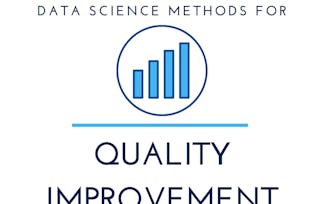In diesem Kurs lernen Sie, wie man Messsysteme auf Prozessstabilität und -fähigkeit analysiert und warum ein stabiler Messprozess unerlässlich ist, bevor man eine statistische Analyse durchführt. Sie werden kontinuierliche Messsysteme analysieren und sowohl die Genauigkeit als auch die Präzision mit Hilfe von R-Software statistisch charakterisieren. Sie werden Messsysteme auf potenzielle, kurzfristige und langfristige statistische Kontrolle und Fähigkeit hin analysieren. Darüber hinaus lernen Sie, wie Sie eine diskrete Messung bewerten und Analysen zur internen Konsistenz, zur Übereinstimmung zwischen Bewertern und zur Übereinstimmung mit einem Standard durchführen. Schließlich lernen Sie, wie Sie Entscheidungen zur Prozessverbesserung von Messsystemen treffen können. Diese Spezialisierung kann im Rahmen des Master of Science in Data Science (MS-DS) der CU Boulder, der auf der Coursera-Plattform angeboten wird, akademisch angerechnet werden. Der MS-DS ist ein interdisziplinärer Studiengang, der Lehrkräfte aus den Fachbereichen Angewandte Mathematik, Informatik, Informationswissenschaften und anderen Bereichen der CU Boulder zusammenbringt. Da die Zulassung leistungsabhängig ist und es kein Bewerbungsverfahren gibt, ist der MS-DS ideal für Personen mit einem breiten Spektrum an grundständiger Ausbildung und/oder Berufserfahrung in Informatik, Informationswissenschaft, Mathematik und Statistik. Erfahren Sie mehr über das MS-DS-Programm unter https://www.coursera.org/degrees/master-of-science-data-science-boulder.

Analyse von Messsystemen
noch 5 Tage! Erwerben Sie das nächste Level mit Coursera Plus für $199 (regulär $399). Jetzt sparen.

Analyse von Messsystemen
Dieser Kurs ist Teil von Spezialisierung für Datenwissenschaftliche Methoden zur Qualitätsverbesserung

Dozent: Wendy Martin
1.714 bereits angemeldet
Bei enthalten
(10 Bewertungen)
Empfohlene Erfahrung
Was Sie lernen werden
Die Begriffe und Konzepte im Zusammenhang mit der Analyse von Messsystemen zu verstehen
Analysieren Sie den Messfehler, um die potenzielle Fähigkeit eines Messsystems zu bestimmen
Analysieren Sie den Messfehler, um die kurz- und langfristige Leistungsfähigkeit eines Messsystems zu bestimmen
Analysieren Sie ein Messsystem für diskrete Daten anhand von Potenzial-, Kurzzeit- und Langzeitstudien
Kompetenzen, die Sie erwerben
- Kategorie: Systeme der Messung
- Kategorie: Korrelationsanalyse
- Kategorie: Streudiagramme
- Kategorie: Datenanalyse
- Kategorie: R (Software)
- Kategorie: Statistische Visualisierung
- Kategorie: Box Plots
- Kategorie: Verifizierung und Validierung
- Kategorie: Statistische Methoden
- Kategorie: Deskriptive Statistik
- Kategorie: Statistische Hypothesentests
- Kategorie: Laufkarte
- Kategorie: Statistische Analyse
- Kategorie: Regressionsanalyse
- Kategorie: Datenqualität
Wichtige Details

Zu Ihrem LinkedIn-Profil hinzufügen
7 Aufgaben
Erfahren Sie, wie Mitarbeiter führender Unternehmen gefragte Kompetenzen erwerben.

Erweitern Sie Ihre Fachkenntnisse
- Lernen Sie neue Konzepte von Branchenexperten
- Gewinnen Sie ein Grundverständnis bestimmter Themen oder Tools
- Erwerben Sie berufsrelevante Kompetenzen durch praktische Projekte
- Erwerben Sie ein Berufszertifikat zur Vorlage

In diesem Kurs gibt es 5 Module
In diesem Modul werden wir lernen, Beziehungen zwischen zwei Variablen zu identifizieren, zu charakterisieren und zu analysieren. Zunächst lernen wir die Korrelation zwischen zwei kontinuierlichen Variablen und Tests auf Signifikanz kennen. Als nächstes lernen wir die Korrelation für ordinale Variablen und die Assoziation für eine nominale und eine kontinuierliche Variable kennen. Schließlich werden wir lernen, die Beziehung zwischen zwei nominalen Variablen zu bewerten.
Das ist alles enthalten
9 Videos2 Lektüren1 Aufgabe2 Diskussionsthemen
In diesem Modul werden wir eine Varianzanalyse für feste und zufällige Effekte für einen einzelnen Faktor durchführen und die Ergebnisse interpretieren. Wir werden zunächst die Variation innerhalb und zwischen den Gruppen untersuchen und die ANOVA-Quelltabelle interpretieren. Wir lernen, wie man die ANOVA mit festen Effekten für Mittelwerte und Streuung unter Berücksichtigung von Normalität und gleicher/ungleicher Varianz durchführt. Wir erstellen Datenvisualisierungen der Ergebnisse, berechnen die statistische Bedeutung und führen Post-hoc-Analysen durch. Schließlich werden wir die ANOVA mit zufälligen Effekten durchführen.
Das ist alles enthalten
15 Videos2 Aufgaben1 Diskussionsthema
In diesem Modul werden wir die Begriffe und Konzepte im Zusammenhang mit der Analyse von Messsystemen verstehen und den Messfehler analysieren, um die potenzielle Fähigkeit eines Messsystems zu bestimmen. Wir werden uns mit den Richtlinien für Messsystemanalysen und den Gleichungen für Messfehler und Leistungsfähigkeit beschäftigen. Anschließend berechnen wir die Variationsquellen aus der ANOVA, ermitteln die größten Variationsquellen und bestimmen die Fähigkeit im Vergleich zur Prozessvariation und zur Spezifikationstoleranz. Schließlich werden wir Datenvisualisierungen erstellen und die Ergebnisse der Analyse interpretieren.
Das ist alles enthalten
11 Videos1 Aufgabe1 Diskussionsthema
In diesem Modul werden wir den Messfehler analysieren, um die kurz- und langfristige Fähigkeit eines Messsystems zu bestimmen. Wir bauen auf dem im vorherigen Modul Gelernten auf und fügen die Bewertung der zugrundeliegenden Annahmen der Normalität, der Unabhängigkeit von Teilegröße und Messfehler sowie der Stabilität des Messfehlers hinzu. Wir führen eine ANOVA durch, um die Ursachen für die Schwankungen zu ermitteln, und bestimmen die Unterscheidung der Messgeräte. Schließlich werden wir Datenvisualisierungen erstellen und die Ergebnisse der Analyse interpretieren.
Das ist alles enthalten
7 Videos2 Aufgaben1 Diskussionsthema
In diesem Modul werden wir ein diskretes Messsystem analysieren, um Übereinstimmung, Konsistenz und Gültigkeit zu bestimmen. Zunächst machen wir uns mit den Begriffen, Definitionen und Verfahren vertraut, die mit der Analyse diskreter Messsysteme verbunden sind. Danach werden wir die Messung der Übereinstimmung mit Hilfe der Kappa-Statistik und die Messung der Nichtübereinstimmung mit Hilfe des Symmetrietests untersuchen. Anschließend lernen wir die Durchführung von Konkordanzanalysen mit zwei Gutachtern und zwei Kategorien, zwei Gutachtern mit mehr als zwei Kategorien und mehr als zwei Gutachtern. Wir werden die Beurteiler auf interne Konsistenz analysieren. Schließlich werden wir die Validität (Übereinstimmung mit einem Standard) bewerten.
Das ist alles enthalten
14 Videos1 Aufgabe1 Diskussionsthema
Erwerben Sie ein Karrierezertifikat.
Fügen Sie dieses Zeugnis Ihrem LinkedIn-Profil, Lebenslauf oder CV hinzu. Teilen Sie sie in Social Media und in Ihrer Leistungsbeurteilung.
Auf einen Abschluss hinarbeiten
Dieses Kurs ist Teil des/der folgenden Studiengangs/Studiengänge, die von University of Colorado Boulderangeboten werden. Wenn Sie zugelassen werden und sich immatrikulieren, können Ihre abgeschlossenen Kurse auf Ihren Studienabschluss angerechnet werden und Ihre Fortschritte können mit Ihnen übertragen werden.¹
Dozent

Mehr von Wahrscheinlichkeitsrechnung und Statistik entdecken
 Status: Kostenloser Testzeitraum
Status: Kostenloser TestzeitraumUniversity of Colorado Boulder
 Status: Kostenloser Testzeitraum
Status: Kostenloser TestzeitraumJohns Hopkins University
 Status: Vorschau
Status: Vorschau Status: Kostenloser Testzeitraum
Status: Kostenloser TestzeitraumKennesaw State University
Warum entscheiden sich Menschen für Coursera für ihre Karriere?

Felipe M.

Jennifer J.

Larry W.

Chaitanya A.
Häufig gestellte Fragen
Um Zugang zu den Kursmaterialien und Aufgaben zu erhalten und um ein Zertifikat zu erwerben, müssen Sie die Zertifikatserfahrung erwerben, wenn Sie sich für einen Kurs anmelden. Sie können stattdessen eine kostenlose Testversion ausprobieren oder finanzielle Unterstützung beantragen. Der Kurs kann stattdessen die Option "Vollständiger Kurs, kein Zertifikat" anbieten. Mit dieser Option können Sie alle Kursmaterialien einsehen, die erforderlichen Bewertungen abgeben und eine Abschlussnote erhalten. Dies bedeutet auch, dass Sie kein Zertifikat erwerben können.
Wenn Sie sich für den Kurs einschreiben, erhalten Sie Zugang zu allen Kursen der Spezialisierung, und Sie erhalten ein Zertifikat, wenn Sie die Arbeit abgeschlossen haben. Ihr elektronisches Zertifikat wird Ihrer Seite "Leistungen" hinzugefügt - von dort aus können Sie Ihr Zertifikat ausdrucken oder Ihrem LinkedIn-Profil hinzufügen.
Ja. Für ausgewählte Lernprogramme können Sie eine finanzielle Unterstützung oder ein Stipendium beantragen, wenn Sie die Anmeldungsgebühr nicht aufbringen können. Wenn für das von Ihnen gewählte Lernprogramm eine finanzielle Unterstützung oder ein Stipendium verfügbar ist, finden Sie auf der Beschreibungsseite einen Link zur Beantragung.
Weitere Fragen
Finanzielle Unterstützung verfügbar,





